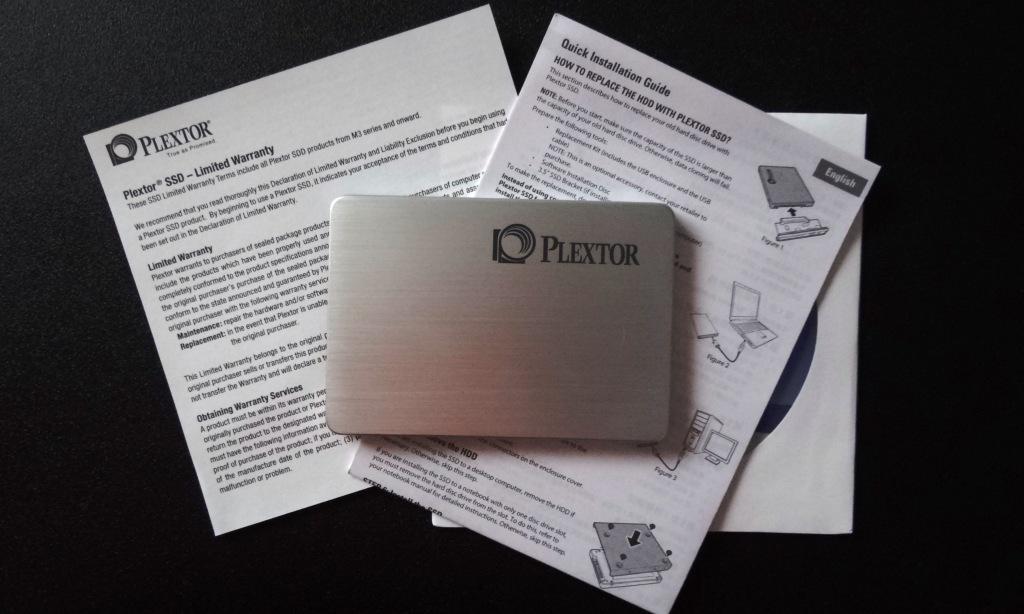REPORT ANALYSIS AND FINAL THOUGHTS
Perhaps the thing we like most about Plextor is their commitment to improving their product and sticking with components that they know and trust. We can’t tell you the number of times we have received e-mail from our readers who were very upset that our tested sample of a certain SSD did not contain the same components as their received same version of hat manufacturers product. The unfortunate truth is that there have been manufacturers who have even switched off synchronous or Toggle Mode memory for more value oriented asynchronous memory. This will not occur with Plextor.
Plextor fine tunes their engineering through use of Marvell controllers and Toshiba Toggle Mode memory and then wraps it up with a five year warranty to let the consumer know they have confidence in their product. Performance of the received sample of the M5 Pro did match manufacturers specifications and is an SSD capable of 100,000 IOPS but we did not have the same success in PCMark Vantage testing where it’s Total Point Score was a bit lower than expected.
This anomaly does sometimes occur with SSDs and average Total Score of Vantage did contrast to the excellent Total Point Scores we received in both AS SSD and Anvil Storage Utilities. This is exactly why we use several programs to confirm overall performance.
Last but not least, we examine the pricing of the M5 Pro and find it to be close to the $1/GB mark with Amazon prices![]() at $129.60 (128GB), $248.49 (256GB) and $439.99 (512GB). Although these are decent prices, Plextor might have to keep a close eye on the competition as it is not unusual to see similar 128GB SSDs at under !100, 256GB SSDs under $200 and, yes, we have even seen 512GB SSDs in the mid-$300 range at times. All in all thought, this is an excellent price for an excellent SSD.
at $129.60 (128GB), $248.49 (256GB) and $439.99 (512GB). Although these are decent prices, Plextor might have to keep a close eye on the competition as it is not unusual to see similar 128GB SSDs at under !100, 256GB SSDs under $200 and, yes, we have even seen 512GB SSDs in the mid-$300 range at times. All in all thought, this is an excellent price for an excellent SSD.
 The SSD Review The Worlds Dedicated SSD Education and Review Resource |
The SSD Review The Worlds Dedicated SSD Education and Review Resource | 


Those writes are a bit “meh” for such modern controller when a 2 year old, very simple SandForce SF-2281 blows them away.
If you want the absolute best, 840 Pro. If bang for the buck, SandForce. 🙂
you’re outta your mind when you try to compare Marvell to Sandforce.
And why exactly is that? I do realize this new Marvell controller is superior to SF, however, it still doesn’t change the fact that those sequintal writes are “meh” at this time and date and that the SF-2281 blows them away. Period on that.
your SF goes “meh” when it comes to incompressible data
You can close compression on SandForce to boost it’s incompressible performance, which renders it slower under other conditions, but still.
My point was that, this drive DOES have “meh” sequintal writes and that’s a fact. When the MDX Tri-Core Samsung’s blow this thing away, I see no point in buying into this drive.
As I said before, if you want the BEST SSD, get the 840 Pro. If not, then there’s nothing wrong with SandForce as they’re still great and very fast SSD’s. And are MUCH better bang for the buck than this drive.
You are currently showing this as slower than the (unnamed specific capacity, but it is) 512GB Samsung 840 Pro. While comparing different capacities is not really fair, I wonder if the benchmarks really say anything beyond the specific system. Take these numbers e.g. ( https://i1-news.softpedia-static.com/images/news2/Plextor-s-Top-Performing-M5P-Series-Benchmarked-7.png ) for the M5P, showing higher speeds than the 840P/512 for the plextor in the 4K section, while being lower in the 64Thrd scenario, which in your tests really seems to be its strong point.
So what I mean to say: Even when there are differences of more than 10%, do they really say anything about this specific SSD or rather more about the SSD in this system? Especially the fact that the other benchmarks shows faster speeds for the 4k single threaded makes me think that there are way more factors not being reflected in these benchmarks and that the only thing really able to tell this apart would be involve many differently configured systems, possibly even chipsets.
You are absolutely correct. Different equipment, chipsets, drivers, and even optimizations will result in a different performance standard. The important thing for any test environment to tackle is to ensure that all testing is exactly the same where a comparison from one solid-state drive to another can be drawn. For example, you will find higher 4k write performance scores from other websites because they optimize their CPU settings. We believe this specific optimization is too difficult for the common user and want to ensure that our scores reflect what they are able to achieve in their own testing. Simply put, our testing is the same result that can be achieved by any user after first installing their SSD. Hope this helps.
SKYPE=ROCKY-TIGER-USA G-TALK=PRINCESS.JASMINE.WOOD@GMAIL.COM MSN LIVE=TIGER_0717@HOTMAIL.COM MSN LIVE=ROCKY_0717@YAHOO.COM MSN LIVE=ROCKY-TIGER@WINDOWSLIVE.COM QQ=859061471 AOL-AIM=ROCKY_TIGER@AOL.COM
SKYPE=ROCKY-TIGER-USA G-TALK=PRINCESS.JASMINE.WOOD@GMAIL.COM MSN LIVE=TIGER_0717@HOTMAIL.COM MSN LIVE=ROCKY_0717@YAHOO.COM MSN LIVE=ROCKY-TIGER@WINDOWSLIVE.COM QQ=859061471 AOL-AIM=ROCKY_TIGER@AOL.COM
SKYPE=ROCKY-TIGER-USA G-TALK=PRINCESS.JASMINE.WOOD@GMAIL.COM MSN LIVE=TIGER_0717@HOTMAIL.COM MSN LIVE=ROCKY_0717@YAHOO.COM MSN LIVE=ROCKY-TIGER@WINDOWSLIVE.COM QQ=859061471 AOL-AIM=ROCKY_TIGER@AOL.COM